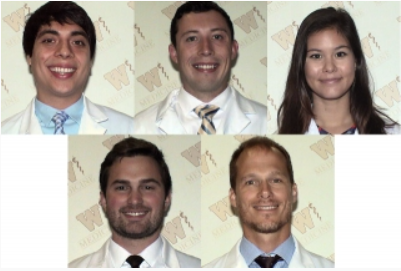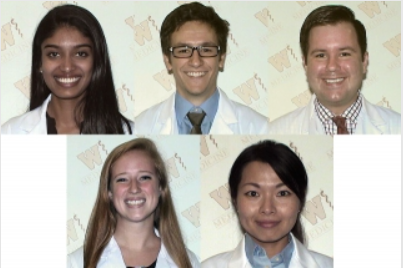 When they began working with Kalamazoo County's Area Agency on Aging in 2015, a group of WMed students was given the task of helping the organization set up an elderly death review board as part of its mission to stop elder abuse.
When they began working with Kalamazoo County's Area Agency on Aging in 2015, a group of WMed students was given the task of helping the organization set up an elderly death review board as part of its mission to stop elder abuse.
Now, some 16 months later, the students said the review board is being established and they are thankful that the work they were a part of will have a lasting impact on the Kalamazoo community.
"For me, what was most striking was how easy it was to make a change in something," said Evan Kohler, a second-year student at WMed. "If the Elderly Death Review Board takes off "¦ that could make a difference for potentially thousands of people."
Kohler, along with second-year students William Bermeo, Kristina Le, Ben Roush and Nathan Whelham, worked closely with the Area Agency on Aging from October 2015 until mid-February as part of the medical school's Active Citizenship program.
Active Citizenship at WMed is a longitudinal program that combines community service with research. Students participate during their first and second years of medical school and work at several different sites throughout the Kalamazoo community.
"WMed is giving back to the community," said Jean Shelton, the medical school's director of Admissions and Student Life. "It's so important to build that into the curriculum, and there's research. It is pretty novel as an educational concept.
"Most schools require community service, others require a research project as a graduation requirement," Shelton added. "Putting the two together the way we have, into Active Citizenship is a neat model."
During their work with the Area Agency on Aging, Kohler said his group learned a great deal about elder abuse and how prolific the problem is locally and nationally.
Le said the group got the chance to take part in home visits with the organization and volunteered during the Area Agency on Aging's food and donation drive during Christmas.
In terms of research, Kohler said the group developed a project that focused on elder abuse with the "idea that we wanted to something that was publishable" and that helped the Area Agency on Aging.
From there, the group began working with faculty in the medical school's Department of Pathology on the research project and connected pathologists with officials at the Area Agency on Aging.
Kohler said faculty in WMed's Department of Pathology, who also work as medical examiners for several counties in Michigan, have been using a questionnaire - the Vulnerable Elderly Assessment Tool - for the past two years as a way to screen for elder abuse in death cases.
Kohler said his group is conducting a retrospective analysis to see if the tool has been effective in guiding clinical judgment.
"Our hope is that we'll show the tool has been effective or we will find some way to improve it, and to bring awareness to elderly abuse in general," Kohler said.
WMed students gain an array of experience during their work at different sites in the community.
 In addition to the Area Agency on Aging, students worked at several others sites, including Family & Children Services.
In addition to the Area Agency on Aging, students worked at several others sites, including Family & Children Services.
At Family & Children Services, students from the medical school got a chance to implement a science curriculum for children who are part of the organization's Link program, which is a supplement to their school day. The program seeks to help children, ages 6 to 17 who have a mental health diagnosis or a developmental disability, develop social and emotional skills for them to be successful.
Jose Lopez-Vera, a second-year student at WMed who was part of the Active Citizenship group at Family & Children Services, said the science curriculum focused on interactive exercises covering subjects like proper hygiene, exercise, healthy eating, how to take a pulse, hand washing and general science, including anatomy, among other things.
As part of their research that came out of the community service project, Lopez-Vera said his group is analyzing what effect their curriculum had on student behavior and the students' general knowledge about science.
"I think youth education, especially youth science education, is really important so I was really excited to be able to put this curriculum together," second-year student Michael Madrid said. "Being able to put something together that has shown to have a positive impact on these kids is really rewarding."
Second-year student Sulin Wu, who worked with Lopez-Vera and Madrid, said she appreciated that the work at Family & Children Services was beneficial in helping her learn about ways that she can volunteer and contribute to the community outside of working in a clinical setting. She also said the experience gave her perspective on the types of resources that are available to community members and patients she may see in the future as a physician.
Second-year student Amy Rechenberg echoed Wu's sentiments and said she enjoyed the work at Family and Community Services because it gave her and her classmates the chance to work in the community outside of the clinical setting.
"You get a better idea of how you can best serve (patients)," she said.
